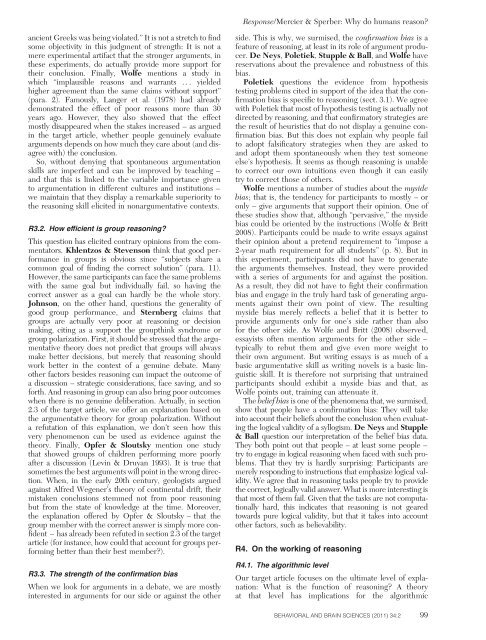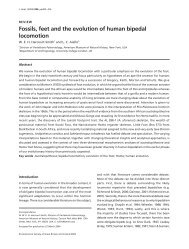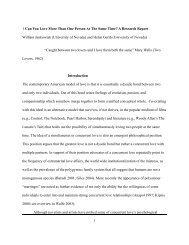Response/Mercier & Sperber: <strong>Why</strong> <strong>do</strong> <strong>hum<strong>an</strong>s</strong> <strong>reason</strong>?signature of its primarily <strong>argumentative</strong> main function. Wewould argue moreover that the main contribution of<strong>reason</strong>ing to individual cognition is in helping peopleevaluate other people’s arguments.Both Ev<strong>an</strong>s <strong>an</strong>d Fr<strong>an</strong>kish suggest <strong>an</strong> interesting way toreconcile our suggestion that <strong>reason</strong>ing may have evolved<strong>for</strong> argumentation <strong>an</strong>d the more classical view that itserves first <strong>an</strong>d <strong>for</strong>emost individual cognitive goals. This individualisticfunction, Ev<strong>an</strong>s argues, might be <strong>an</strong> exaptationfrom <strong>an</strong> initial <strong>argumentative</strong> function favored by the concomit<strong>an</strong>tevolution of “l<strong>an</strong>guage, metarepresentation, <strong>an</strong>d large<strong>for</strong>ebrains” (para. 6). Fr<strong>an</strong>kish proposes that <strong>reason</strong>ing, evenif it primarily evolved <strong>for</strong> argumentation, might have beensubst<strong>an</strong>tially “co-opted to play a role in individual cognition”(para. 5). As we said in the preceding paragraph, we <strong>do</strong> notexclude the possibility that <strong>reason</strong>ing may also be adaptive inhelping individual ratiocination. Still, our argument remainsthat the m<strong>an</strong>y apparent failings of <strong>reason</strong>ing – our knowledgeof which owes much to Ev<strong>an</strong>s himself – make bettersense as the signature of a main <strong>argumentative</strong> function.Ev<strong>an</strong>s insists on the role of <strong>reason</strong>ing in <strong>an</strong>ticipating thefuture. While <strong>an</strong>ticipating the future is a major aspect ofhum<strong>an</strong> cognition, it is not clear to us what specific role<strong>reason</strong>ing plays in this process, by contrast with other abilitiessuch as imagination <strong>an</strong>d simulation. It is even lessclear what features of <strong>reason</strong>ing, if <strong>an</strong>y, are specifically tailored<strong>for</strong> this role. Fr<strong>an</strong>kish points out that <strong>reason</strong>ing c<strong>an</strong>be used to strengthen our resolve by buttressing ourdecisions with supporting arguments. Indeed, <strong>reason</strong>ingc<strong>an</strong> <strong>do</strong> exactly that. However, if weakness of resolve hadbeen enough of a problem to favor the evolution of amech<strong>an</strong>ism to deal with it, presumably the natural selectionsolution would have been to strengthen our resolvedirectly rather th<strong>an</strong> to adapt <strong>reason</strong>ing to find resolutionstrengtheningarguments. Moreover, this very tendencyto use <strong>reason</strong>ing to bolster our beliefs <strong>an</strong>d decisions islikely to have more negative th<strong>an</strong> positive consequences,as highlighted in section 4.2 of the target article.R3. Strengths <strong>an</strong>d biases of <strong>reason</strong>ing<strong>an</strong>d argumentationR3.1. Are we really good at argumentation?If <strong>reason</strong>ing evolved <strong>for</strong> argumentation, <strong>hum<strong>an</strong>s</strong> shouldpossess decent <strong>argumentative</strong> skills: They should be ableto engage in <strong>an</strong> in<strong>for</strong>mal debate, constructing, evaluating,<strong>an</strong>d rebutting arguments. Several commentators questionthat this is so, pointing to research that shows signific<strong>an</strong>timprovement in <strong>argumentative</strong> ability through learning<strong>an</strong>d casting <strong>do</strong>ubt on the data we presented to defend<strong>argumentative</strong> skills.Harrell, Kuhn, <strong>an</strong>d Wolfe all point to very interestingdata showing improvement in argumentation skills withtraining – as well as the relative poverty of these skillsbe<strong>for</strong>e training. Most of the studies cited, however, bearon meta-<strong>argumentative</strong> skills. Kuhn et al. (2008) reportgains in “meta-level communications about the discourse”(p. 1310). Larson et al. (2004) study the underst<strong>an</strong>ding oflong written arguments. Critical thinking skills are oftenevaluated through the ability to draw argument schemasor to recognize the different components of <strong>an</strong> argument<strong>an</strong>d their relationship to one <strong>an</strong>other. Such skills mayvery well be crucial <strong>for</strong> success in modern academic lifeor even be of relev<strong>an</strong>ce to participation in democratic life,<strong>an</strong>d their study in import<strong>an</strong>t in its own right. However,they are not part of what one c<strong>an</strong> expect basic <strong>argumentative</strong>skills to be. L<strong>an</strong>guage provides a useful <strong>an</strong>alogy. Onec<strong>an</strong> be a fluent l<strong>an</strong>guage user without being able to tellwhat a verb is or, a <strong>for</strong>tiori, to parse a sentence. Likewise,one c<strong>an</strong> be a skilled arguer without being able to recognizeargument <strong>for</strong>ms or draw argument schemas. In both cases,these abilities c<strong>an</strong> help – a mastery of syntax c<strong>an</strong> make onea better poet, a mastery of argument schemes a better essayist– but they are not necessary.One study seems to tap into a more fundamental <strong>argumentative</strong>skill – the ability to draw counterarguments (Goldsteinet al. 2009). In this experiment, sixth <strong>an</strong>d seventh graders hadto choose between a counterargument <strong>an</strong>d a novel argumentin a fictitious discussion, <strong>an</strong>d they tended to choose the latterinstead of the <strong>for</strong>mer. Even though the context successfullymimicked a debate, it <strong>do</strong>es not follow that the particip<strong>an</strong>tswere highly motivated to defend a position that had been arbitrarilyassigned to them. In such a context, it is not surprisingthat they should engage in satisficing <strong>an</strong>d pick <strong>an</strong> argumentthat might just be enough. Moreover, although the counterargumentoption might have been <strong>for</strong>mally superior, it is notclear that it would have been the most efficient one in a realdiscussion.Harrell <strong>an</strong>d Wolfe also dispute the data used as evidenceof people’s basic <strong>argumentative</strong> skills. Harrell suggests deflationaryinterpretations <strong>for</strong> several of the findings we cite,but, however ingenious, these interpretations are not compelling.To be more specific: Bailenson <strong>an</strong>d Rips (1996) <strong>do</strong>observe that being the first speaker increases the burdenof proof. But with contentious first sentences such as “abortionsshould not be illegal” (p. S7), this is hardly surprising –or nonnormative. In Rips (2002), the repetitions are nothingbut innocuous, <strong>an</strong>d so particip<strong>an</strong>ts are right to discountarguments accordingly. Neum<strong>an</strong> et al. (2006) <strong>do</strong> not reallyobserve worse per<strong>for</strong>m<strong>an</strong>ce among people who argue. Particip<strong>an</strong>tswere merely avoiding pointing out a fallacy in apolite dialogue (cf. Rips 2002, n. 1), but they were still perfectlyable to detect it in a rougher discussion. Thompsonet al. (2005) observed more belief bias when people wereengaged in <strong>an</strong> argument ... because people were askedabout their opinion <strong>an</strong>d not logical validity. Far fromhaving “difficulty producing evidence <strong>for</strong> a claim” (Harrell,para. 7), the particip<strong>an</strong>ts in the study by Sá et al. (2005)were able to muster nearly six arguments to defend theiropinion on difficult topics (<strong>for</strong> example, <strong>Why</strong> <strong>do</strong> childrenfail in school?). If these arguments were not always thebest, this is only to be expected in such circumst<strong>an</strong>ces (asexplained in sect. 2.3 of the target article).Ulem<strong>an</strong>, Kressel, & Rim [Ulem<strong>an</strong> et al.] point outthat the strong <strong>an</strong>d weak arguments used in most persuasionresearch are “pretested ... to have these properties”(para. 10), so that it is hardly surprising that strong argumentsshould be more convincing. That researchers w<strong>an</strong>tto make sure their intuitions about argument strengthare appropriate <strong>do</strong>es not me<strong>an</strong> that they are withoutgrounding, however. For inst<strong>an</strong>ce, when trying to persuadestudents that a new exam would be beneficial, astrong argument might be that “average starting salariesare higher <strong>for</strong> graduates of schools with the exams”(Petty & Cacioppo 1979, p. 1921) accomp<strong>an</strong>ied by relev<strong>an</strong>tstatistics. By contrast, a weak argument might read “by notadministering the exams, a tradition dating back to the98 BEHAVIORAL AND BRAIN SCIENCES (2011) 34:2
Response/Mercier & Sperber: <strong>Why</strong> <strong>do</strong> <strong>hum<strong>an</strong>s</strong> <strong>reason</strong>?<strong>an</strong>cient Greeks was being violated.” It is not a stretch to findsome objectivity in this judgment of strength: It is not amere experimental artifact that the stronger arguments, inthese experiments, <strong>do</strong> actually provide more support <strong>for</strong>their conclusion. Finally, Wolfe mentions a study inwhich “implausible <strong>reason</strong>s <strong>an</strong>d warr<strong>an</strong>ts ... yieldedhigher agreement th<strong>an</strong> the same claims without support”(para. 2). Famously, L<strong>an</strong>ger et al. (1978) had alreadydemonstrated the effect of poor <strong>reason</strong>s more th<strong>an</strong> 30years ago. However, they also showed that the effectmostly disappeared when the stakes increased – as arguedin the target article, whether people genuinely evaluatearguments depends on how much they care about (<strong>an</strong>d disagreewith) the conclusion.So, without denying that spont<strong>an</strong>eous argumentationskills are imperfect <strong>an</strong>d c<strong>an</strong> be improved by teaching –<strong>an</strong>d that this is linked to the variable import<strong>an</strong>ce givento argumentation in different cultures <strong>an</strong>d institutions –we maintain that they display a remarkable superiority tothe <strong>reason</strong>ing skill elicited in non<strong>argumentative</strong> contexts.R3.2. How efficient is group <strong>reason</strong>ing?This question has elicited contrary opinions from the commentators.Khlentzos & Stevenson think that good per<strong>for</strong>m<strong>an</strong>cein groups is obvious since “subjects share acommon goal of finding the correct solution” (para. 11).However, the same particip<strong>an</strong>ts c<strong>an</strong> face the same problemswith the same goal but individually fail, so having thecorrect <strong>an</strong>swer as a goal c<strong>an</strong> hardly be the whole story.Johnson, on the other h<strong>an</strong>d, questions the generality ofgood group per<strong>for</strong>m<strong>an</strong>ce, <strong>an</strong>d Sternberg claims thatgroups are actually very poor at <strong>reason</strong>ing or decisionmaking, citing as a support the groupthink syndrome orgroup polarization. First, it should be stressed that the <strong>argumentative</strong><strong>theory</strong> <strong>do</strong>es not predict that groups will alwaysmake better decisions, but merely that <strong>reason</strong>ing shouldwork better in the context of a genuine debate. M<strong>an</strong>yother factors besides <strong>reason</strong>ing c<strong>an</strong> impact the outcome ofa discussion – strategic considerations, face saving, <strong>an</strong>d so<strong>for</strong>th. And <strong>reason</strong>ing in group c<strong>an</strong> also bring poor outcomeswhen there is no genuine deliberation. Actually, in section2.3 of the target article, we offer <strong>an</strong> expl<strong>an</strong>ation based onthe <strong>argumentative</strong> <strong>theory</strong> <strong>for</strong> group polarization. Withouta refutation of this expl<strong>an</strong>ation, we <strong>do</strong>n’t seen how thisvery phenomenon c<strong>an</strong> be used as evidence against the<strong>theory</strong>. Finally, Opfer & Sloutsky mention one studythat showed groups of children per<strong>for</strong>ming more poorlyafter a discussion (Levin & Druy<strong>an</strong> 1993). It is true thatsometimes the best arguments will point in the wrong direction.When, in the early 20th century, geologists arguedagainst Alfred Wegener’s <strong>theory</strong> of continental drift, theirmistaken conclusions stemmed not from poor <strong>reason</strong>ingbut from the state of knowledge at the time. Moreover,the expl<strong>an</strong>ation offered by Opfer & Sloutsky – that thegroup member with the correct <strong>an</strong>swer is simply more confident– has already been refuted in section 2.3 of the targetarticle (<strong>for</strong> inst<strong>an</strong>ce, how could that account <strong>for</strong> groups per<strong>for</strong>mingbetter th<strong>an</strong> their best member?).R3.3. The strength of the confirmation biasWhen we look <strong>for</strong> arguments in a debate, we are mostlyinterested in arguments <strong>for</strong> our side or against the otherside. This is why, we surmised, the confirmation bias is afeature of <strong>reason</strong>ing, at least in its role of argument producer.De Neys, Poletiek, Stupple & Ball, <strong>an</strong>d Wolfe havereservations about the prevalence <strong>an</strong>d robustness of thisbias.Poletiek questions the evidence from hypothesistesting problems cited in support of the idea that the confirmationbias is specific to <strong>reason</strong>ing (sect. 3.1). We agreewith Poletiek that most of hypothesis testing is actually notdirected by <strong>reason</strong>ing, <strong>an</strong>d that confirmatory strategies arethe result of heuristics that <strong>do</strong> not display a genuine confirmationbias. But this <strong>do</strong>es not explain why people failto a<strong>do</strong>pt falsificatory strategies when they are asked to<strong>an</strong>d a<strong>do</strong>pt them spont<strong>an</strong>eously when they test someoneelse’s hypothesis. It seems as though <strong>reason</strong>ing is unableto correct our own intuitions even though it c<strong>an</strong> easilytry to correct those of others.Wolfe mentions a number of studies about the mysidebias; that is, the tendency <strong>for</strong> particip<strong>an</strong>ts to mostly – oronly – give arguments that support their opinion. One ofthese studies show that, although “pervasive,” the mysidebias could be oriented by the instructions (Wolfe & Britt2008). Particip<strong>an</strong>ts could be made to write essays againsttheir opinion about a pretend requirement to “impose a2-year math requirement <strong>for</strong> all students” (p. 8). But inthis experiment, particip<strong>an</strong>ts did not have to generatethe arguments themselves. Instead, they were providedwith a series of arguments <strong>for</strong> <strong>an</strong>d against the position.As a result, they did not have to fight their confirmationbias <strong>an</strong>d engage in the truly hard task of generating argumentsagainst their own point of view. The resultingmyside bias merely reflects a belief that it is better toprovide arguments only <strong>for</strong> one’s side rather th<strong>an</strong> also<strong>for</strong> the other side. As Wolfe <strong>an</strong>d Britt (2008) observed,essayists often mention arguments <strong>for</strong> the other side –typically to rebut them <strong>an</strong>d give even more weight totheir own argument. But writing essays is as much of abasic <strong>argumentative</strong> skill as writing novels is a basic linguisticskill. It is there<strong>for</strong>e not surprising that untrainedparticip<strong>an</strong>ts should exhibit a myside bias <strong>an</strong>d that, asWolfe points out, training c<strong>an</strong> attenuate it.The belief bias is one of the phenomena that, we surmised,show that people have a confirmation bias: They will takeinto account their beliefs about the conclusion when evaluatingthe logical validity of a syllogism. De Neys <strong>an</strong>d Stupple&Ballquestion our interpretation of the belief bias data.They both point out that people – at least some people –try to engage in logical <strong>reason</strong>ing when faced with such problems.That they try is hardly surprising: Particip<strong>an</strong>ts aremerely responding to instructions that emphasize logical validity.We agree that in <strong>reason</strong>ing tasks people try to providethe correct, logically valid <strong>an</strong>swer. What is more interesting isthat most of them fail. Given that the tasks are not computationallyhard, this indicates that <strong>reason</strong>ing is not gearedtowards pure logical validity, but that it takes into accountother factors, such as believability.R4. On the working of <strong>reason</strong>ingR4.1. The algorithmic levelOur target article focuses on the ultimate level of expl<strong>an</strong>ation:What is the function of <strong>reason</strong>ing? A <strong>theory</strong>at that level has implications <strong>for</strong> the algorithmicBEHAVIORAL AND BRAIN SCIENCES (2011) 34:2 99




